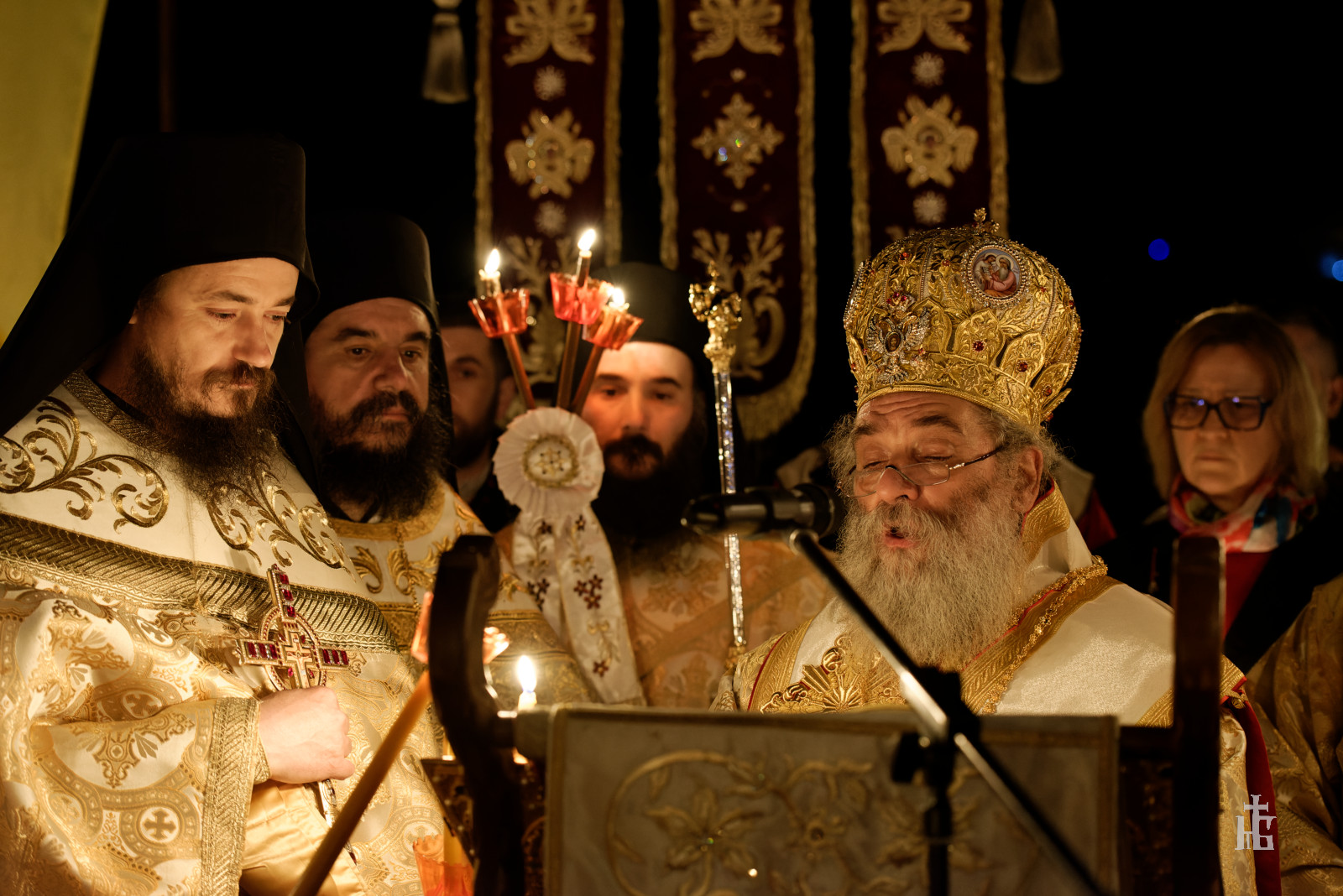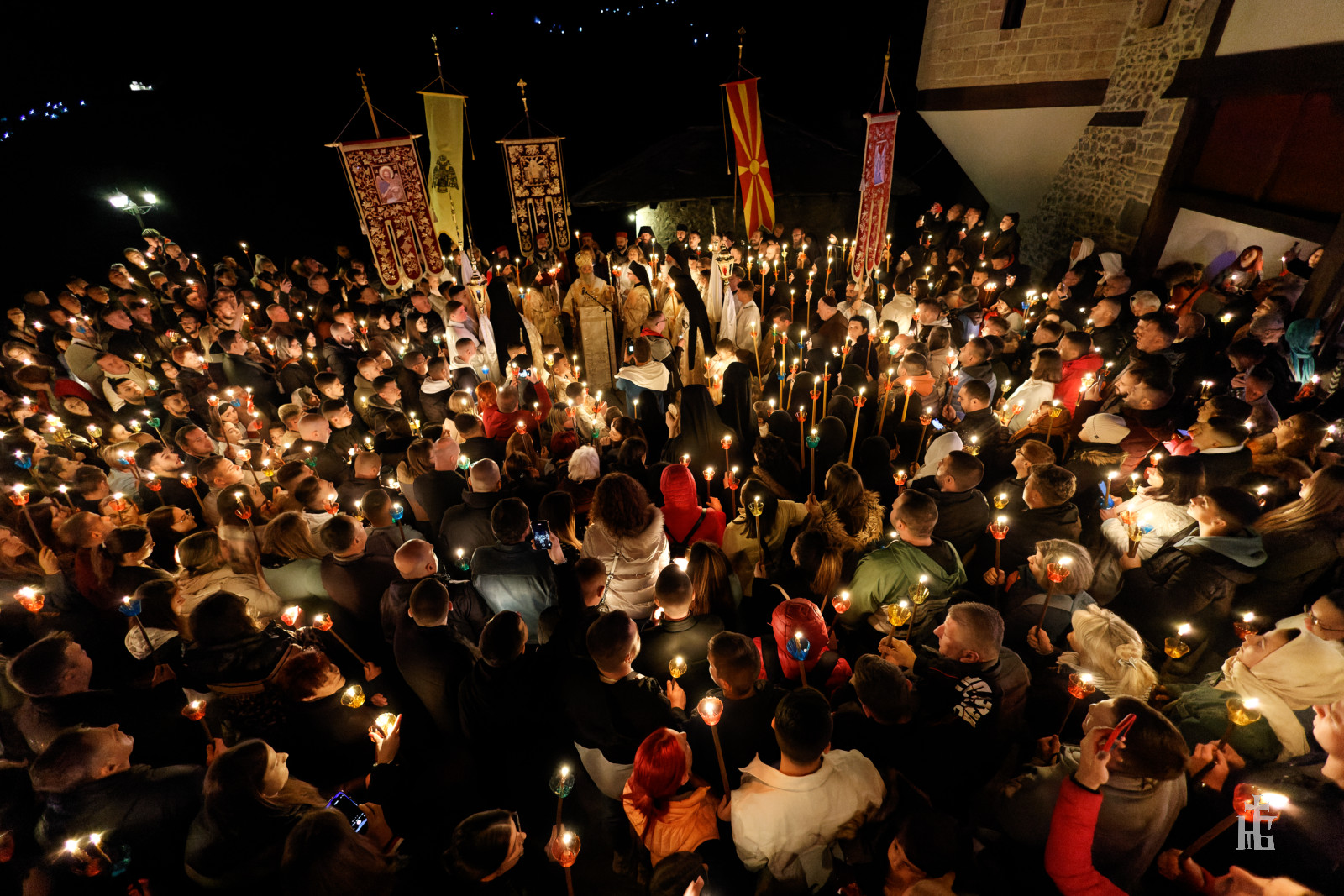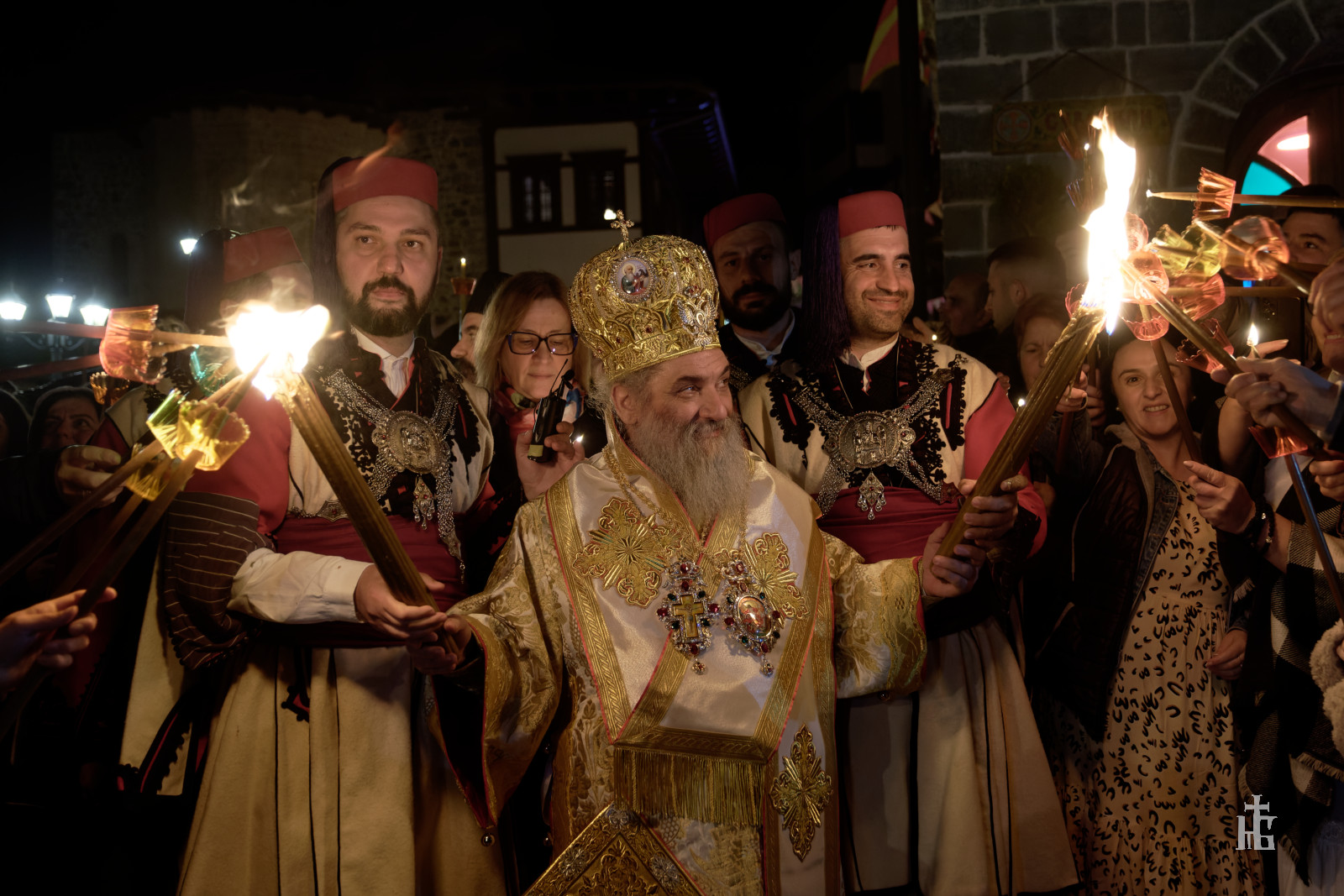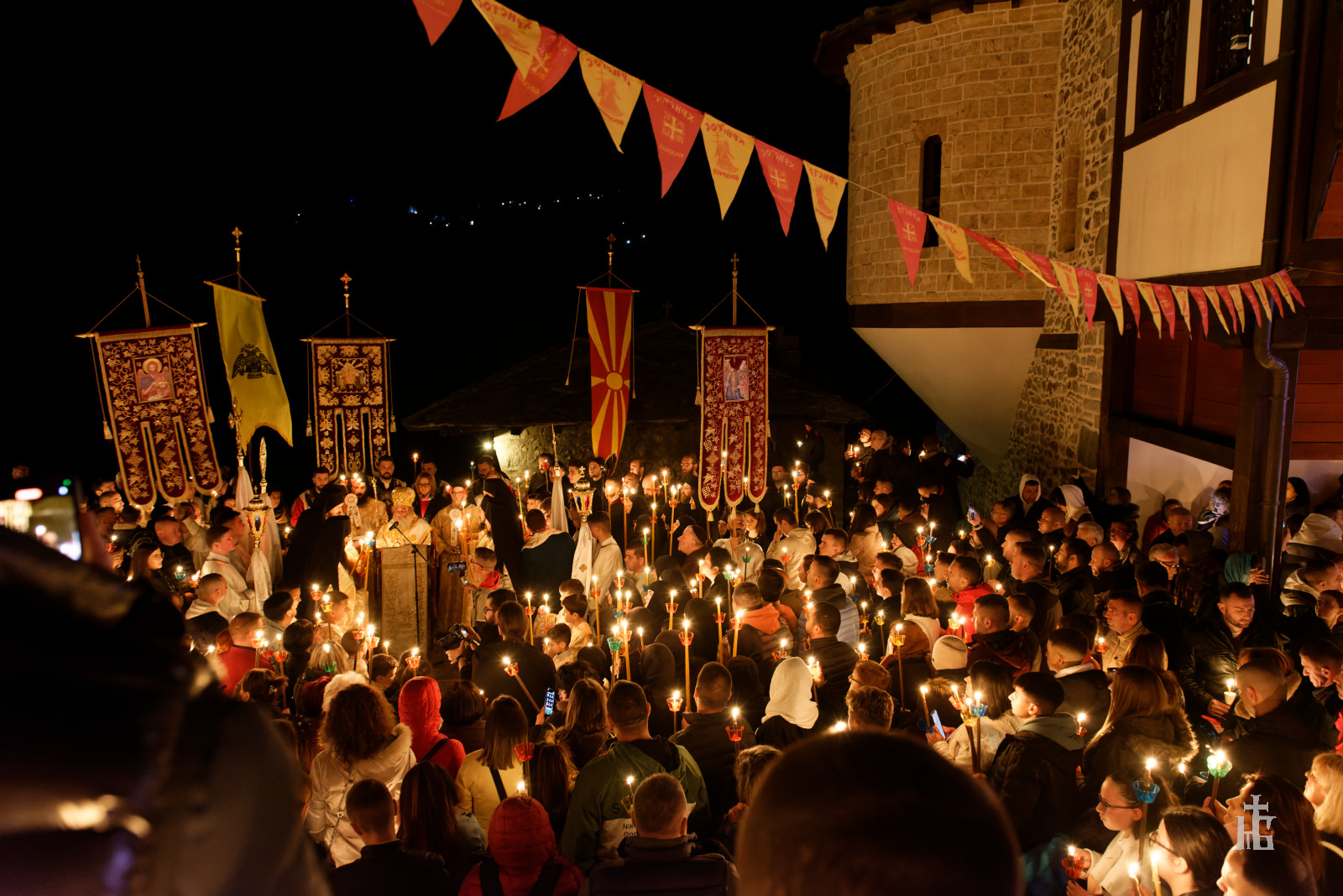Homily of His Grace, Bishop Partenij of Antania, Delivered during the Paschal Vigil, April 16, 2023, in the Year of the Lord
Beloved worshipers of the Risen One,
To celebrate the Holy Pascha — our Passover, the Resurrection—means to participate in the “new creation” brought forth through the glorious Resurrection of our Savior, the Lord Jesus Christ. For He came into the world to re-create the world, to renew Adam—who had fallen under the reign of death—and to restore humanity from sin. “Jesus of Nazareth, a Man attested by God through miracles, wonders, and signs, whom death could not hold” (cf. Acts 2:22-24), has become for us the new Adam. Thus, our calling is to become partakers and co-creators of this new creation through the Resurrection, to partake in the new world revealed by Christ.

Some may object: “What kind of new world is this, when all around us we see the opposite of what Jesus spoke about? We see evil, wars, hardened ideologies, conflicting philosophies, fanaticism, suffering, and death.” However, if we carefully observe human history, the personal lives of those who have chosen the path of the Cross and Resurrection, the lives of the saints, and the hearts of those who are conformed to Christ, we will discern that the Risen One has indeed created a new world—a new reality whose foundation is the grace, mercy, and love of God.
It is precisely in the contrast with this fallen world—“which lies in wickedness” (1 John 5:19)—that the reality of the new creation becomes evident: the God-wrought world. We see people who, though surrounded by evil, have chosen to follow the path of goodness. We see individuals who, despite being pressed by the sorrow and melancholy of this world, rejoice gloriously in the realm of grace. We encounter personalities who, amidst the darkness of this age, shine with an ineffable light and beauty.
In addition, Christ has re-created the world even in a civilizational sense. We all notice that in our time, society is taking a strange turn, especially concerning the concept of family. We hear of same-sex marriages, gender identities, and transgenderism. We do not judge anyone nor deny anyone their right to choose, but it is important, amidst these tendencies that seem alien to genuine human joy, to remind ourselves that true equality and freedom are found only in Christ. Where else could man be free, if not in the One who created him with free will and the capacity for choice?
One of the blessings of the new world in Christ is marriage, which has also become a civilizational good. Marriage is not a human invention but a divine institution, established in mutual love—a love that forgets itself and sacrifices itself for the other. “For this reason, a man shall leave his father and mother and be joined to his wife, and the two shall become one flesh. So then, they are no longer two, but one flesh” (Mark 10:7-8). This is the true definition of marriage; this is the foundation of our Christian civilization—within the warm corner of life called family.
A true Christian marriage produces healthy families, and healthy families nurture free and wholesome individuals. Today, we constantly witness various demands and declarations for freedom. Yet we must understand that if freedom is not rooted in divine revelation—if it is not grounded in the calling to become fully human, to become a person according to the image and likeness of God—and if it does not know its purpose or its limits, then it is nothing but the bitterest form of slavery and a tragic self-destruction.

It is an undeniable fact that the Savior Christ revealed that women are free, equal, and bear the image of God—not according to human viewpoints and standards but according to God’s divine purpose. Indeed, no other civilization, religion, or social system prior to Christ had ever elevated women to such equality and dignity as in Christian civilization. The concept of marriage, as we know it today—between one man and one woman, as equally honorable persons united in a holy partnership and sacred union—did not exist anywhere. Polygamy was the norm. In the best of cases, women were viewed merely as instruments for reproduction, considered the property of their husbands. This was true even in advanced civilizations, such as those of the Egyptians, Greeks, and Romans. And it was also the case among the Jews, though they were uniquely enlightened concerning the one true God.
We can clearly see the social revolution Christ brought about! It is no coincidence that after His Resurrection, Christ first appeared to women—first to His Mother and then to the myrrh-bearing women. By doing so, He highlighted the dignity and role of women in the new creation—that they would be both mothers and heralds of goodness and beauty. This sacred role is undoubtedly essential for building a healthy society.
The Lord Christ revealed God’s truth not only regarding the family but also in relation to the most essential matter: the deification of man. This is, in fact, our purpose, our ultimate goal, the very meaning of our existence. It is through union with God, by participating in His uncreated energies, that we fulfill this purpose. For God became man so that we might become gods by grace. The prophet and king David, in spiritual exultation, proclaims: “I said: ‘You are gods, and all of you are sons of the Most High'” (Psalm 81:6).
And in order for us to become a new creation, beloved, we must not forget the two greatest commandments that the divine lips of the Savior gave us: “Love the Lord your God with all your heart, with all your soul, and with all your mind;” and the second, which is like it: “Love your neighbor as yourself!” He immediately adds: “On these two commandments hang all the Law and the Prophets” (Matthew 22:37–40).
Right before His Passion, in the Gospel of Saint John the Theologian, where the Lord, on His way to suffering, speaks to and teaches His holy apostles, He emphasizes several times that they should love one another. He says: “A new commandment I give to you, that you love one another; as I have loved you, so you also must love one another. By this, everyone will know that you are My disciples, if you have love for one another” (John 13:34–35). And further: “Abide in My love!… This is My commandment: that you love one another as I have loved you” (John 15:9–12). And again: “This command I give you: that you love one another” (John 15:17). Finally, He prays to His Father, saying: “That they may all be one” (John 17:21). Several times, Christ emphasizes love as the fundamental characteristic of Christians.
Here we are tonight, each of us holding a candle in hand, a lit lambada. Our faith is a faith of light. We are called to be bearers of this light. If our Savior is the Light, then we, too, beloved, must become light. And we will only become light if we love one another. It is by love alone that we will be recognized as belonging to Christ. Nothing else will serve as proof.
Beloved, we are gathered here tonight precisely because of Christ’s love. This Feast of Feasts—this celebration above all celebrations—is not merely a historical tradition. This feast renews us and gives us life. Through the Resurrection, as we have said, Christ desires and is able to make us a new creation—if we allow Him to do so. Let us open our hearts to Him, beloved, and let Him make us into what He desires, into what He died on the Cross and rose from the dead to accomplish.
The world in which we live is waiting to see light and love from us Christians. It is we Christians who bear the responsibility for the state of the world today. Sadly, even those of us within the Church often act wrongly and distort the pure, God-revealed faith of light.
Tonight, we have gathered to greet the True Sun—the Sun of Righteousness—before the rising of the physical sun. Before the sun of this day dawns, we glorify our spiritual Sun. This is the brightest night, the dawn of the unending day—Christ our God, for Whom our souls yearn with an unspeakable longing. It is in the soul’s very nature to long for Christ, for He is always near. Even in the darkest moments of our lives, if we seek Him, He will come to us and never abandon us. His Resurrection is our life and hope. A Christian is always an optimist. And if at times a Christian shows pessimism, believe me, it is because they have, to some extent, lost their faith.

Beloved, let us not wander through this world seeking anything other than the one new thing under the sun—our Savior and His Resurrection. I wish that you leave this place transformed by His light. From this day forward, may no word of judgment pass your lips, but instead embrace the world with His love. For Christ calls us to precisely such love—a love that forgives all and gives itself for others, regardless of how they treat us. We are His disciples, sent into this world. How? Christ said to His Apostles: “Behold, I send you out as sheep among wolves” (Matthew 10:16). This means not with weapons or violence. The Christian reveals and proclaims the Risen Christ through meekness and love.
Let us give thanks to the Lord, for this year our holy Church was honored to receive, for the first time, the Holy Fire directly from the Holy Sepulcher in Jerusalem. The Holy Sepulcher remains, to this day, a witness to the greatest event in history—an event that transformed the world and gave it the opportunity for salvation. Last year, by the grace of God, I was blessed to serve at the Holy Church of the Resurrection in the Holy City, where the empty Tomb of Christ is located. I can testify, without a doubt, that no other place possesses such transformative energy. Truly, it is a great honor and blessing for us that God has granted us the privilege of receiving the Blessed Fire this Easter directly from the Holy Land. This historic event was made possible through the efforts of the Government, led by Prime Minister Mr. Dimitar Kovačevski, with special contributions from the Minister of Defense, Miss Slavjanka Petrovska, who, as a spiritual child of our monastery, is here with us tonight. May the arrival of the Holy Fire be a blessing to all, so that, transformed by Christ’s light, we may become better people. We, who have gathered here this evening, are not few—may we become the leaven that inspires those around us to become better as well.

This night, Christ calls us to joy. Once again, I urge you: receive our Savior into your hearts and keep Him there until the end of your lives, for the Kingdom of Heaven is won each day. Eternity is attained daily. By overcoming sin, passion, and selfish desires day by day, you overcome the death within yourself. This is the blessing Christ has given us: to conquer through His grace each day and thus gain eternity.
Christ is Risen!
Christ is Risen!
Christ is Risen!















